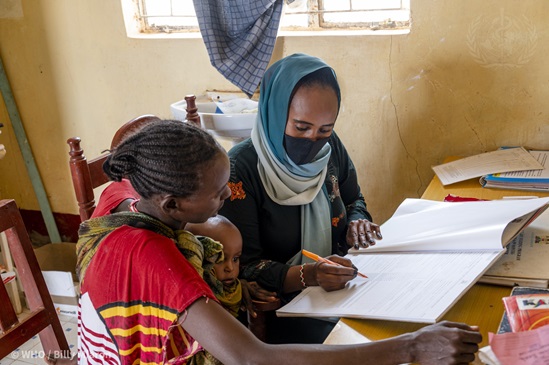Methodology for the Global Anaemia Estimates
The WHO Department of Nutrition and Food Safety (NFS) regularly updates country, regional and global estimates of the SDG 2.2.3 indicator on the prevalence of anaemia in women aged 15-49 years.

Community health volunteer goes through nutrition records at the facility in Korr, Marsabit, Kenya.
Download key documents
Estimates for data sources and analysis
Data sources for the estimates are accessed in two forms: (1) anonymised individual-level haemoglobin data when available; and (2) summary statistics coming from the Vitamin and Mineral Nutrition Information System (VMNIS). WHO has developed tools to support countries to monitor their national anaemia status as well as individual level data.
Access the data analysis tools
/nutrition-and-food-safety-(nfs)/monitoring-nutritional-status-food-safety-events-(mnf)/micronutrient-survey-analyser-screenshot.tmb-1920v.jpg?sfvrsn=8c0f06dc_1)
Micronutrient survey analyser
The Micronutrient survey analyser is an online tool developed by the Department of Nutrition and Food Safety (WHO) which aims to promote best practices on data collection, analyses, and reporting of micronutrients biomarkers.
/nutrition-and-food-safety-(nfs)/monitoring-nutritional-status-food-safety-events-(mnf)/vmnis-platform-screenshot.tmb-1920v.jpg?sfvrsn=775c5d7c_1)
WHO Micronutrients database, part of the Vitamin and Mineral Nutrition Information System (VMNIS), provides summary data on vitamin and mineral status of populations.
The database can be accessed through two WHO platforms:
- The Vitamin and Mineral Nutrition Information System (VMNIS), formerly known as the Micronutrient Deficiency Information System (MDIS), was established in 1991 following a request by the World Health Assembly to strengthen surveillance of micronutrient deficiencies at the global level.
- The Nutrition Data Portal, which aims to facilitate access to data that encompasses several areas of nutrition and related indicators, including micronutrients, child growth and malnutrition, key indicators within the Global Nutrition Monitoring Framework, and nutrition-related health and development data.
